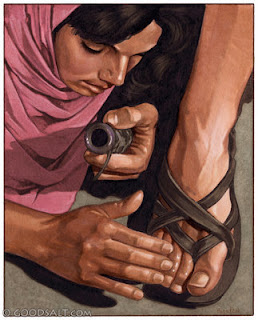An aroma is a curious thing. It can bring back a precious memory. It can remind us of a person or an event. It can be familiar or unmistakable, and it can even create a mood or enhance our energy level.
Tiny, dispersed molecules can produce powerful aromas with a big effect. In fact, aroma therapy is a multi-million dollar enterprise, so powerful are its scents to people.
One of the most devastating effects of the coronavirus has been the loss of the sense of smell for many who have contracted COVID-19. There are even support groups for those who have lost their sense of smell, because it is so debilitating.
The Old Testament speaks of the aroma of burnt sacrifices on altars giving an aroma “pleasing to the Lord” (Leviticus 9:1). Through the centuries faith communities have used the burning of fragrant incense to symbolize the prayers of the people filling the air. The smell of it wafting through the sanctuary can add to an experience of the “holy.”
One of the joys of the season of Easter are the fragrant lilies and other spring flowers blooming in great abundance and reminding us of the rebirth of nature after a long winter season.
The Apostle Paul connected an experience of God’s presence with the sense of smell when he said to the church in Corinth that God “uses us to spread the aroma of the knowledge of him everywhere.” (II Corinthians 2:14).
How do we do this? It is not the kind of thing one accomplishes with air freshener or even with a church filled with holy incense. Spreading the knowledge of Christ is also not solely about book learning or teaching information about our faith.
It is more about a way of being that demonstrates Christ by our acts of love, generosity, humility and reconciliation. Like an aroma from dispersed molecules, small signs of Christ’s love can have a large, pervasive effect in the world. “Not all of us can do great things,” said Mother Teresa. “But we can do small things with great love.”
As “Easter people,” we share the good news of the resurrection; but we also live it in subtle, grace-filled ways. Like a fragrance that lingers, an act of selfless compassion or kindness lives on like nothing else.
Mary of Bethany humbly anointed Jesus’ feet with expensive ointment, and “the house was filled with the fragrance of her perfume” (John 12:3). It was her sacrificial, extravagant gift that was the real fragrance in the room. And just as Jesus foretold, the memory of her tiny gift has spread like a fragrance across the earth wherever the gospel is preached. (Matthew 26:13).
There has long been a sweet smell in Dauphin County, Pennsylvania. It is chocolate. Milton Hershey, an early 20th century businessman, made a fortune on his chocolate business, especially with the iconic foil-covered “Hershey Kisses.”
His generosity to the community was as pervasive as the scent of chocolate. Hershey built homes, parks, schools, public transportation and an orphanage, to name a few of his philanthropic gifts (www.hersheystory.org). The goodness lingers on even to this day.
Pope Francis’ recent visit to Iraq has left a pervasive effect on the peace process between rival faith communities in the Middle East. Peacemaking through simple acts of conversation and respect can spread a scent of hope and reconciliation like nothing else.
Be the aroma of the knowledge of Christ where you live and have influence. Be the one to give generously, the one who crosses lines of division to extend welcome and kindness. Be the one who is willing to humbly engage in small tasks out of great love for Christ.
When you emulate Christ, even in small, sacrificial ways, God notices and people will notice. The aroma will be unmistakable, and people will gain a knowledge of God like nothing else. Never underestimate the power of the aroma of Christ-like actions.

























